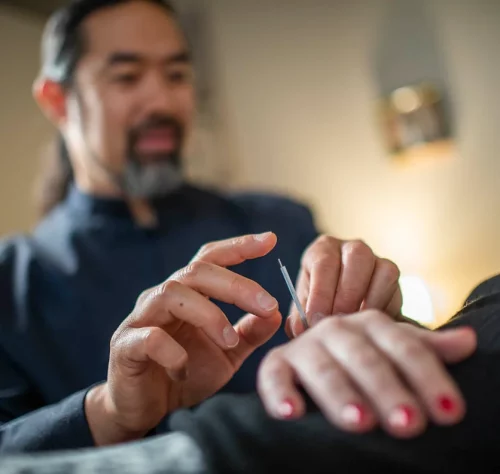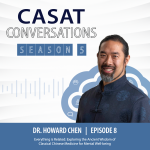Expanding Perspective: Incorporating Ancient Wisdom in Modern Medicine
Please share with us about yourself and why you do the work that you do.
Hello, I’m Howard Chen, MD. I’m a Family and Integrative Medicine physician, Clinical Faculty and Assistant Professor of Clinical Family Medicine at the UNR, and  Board Certified in Medical Acupuncture. Additionally, I teach Chinese Medicine to students of both Western and Chinese Medicine. I’m currently on sabbatical from my Integrative Medicine Clinic, The Chen Center, studying more Chinese Medicine in a graduate Traditional Chinese Medicine program. In terms of why I do the work I do, I think that the expansion of the use of Chinese and Integrative Medicine in modern healthcare has the potential to improve patient satisfaction, treatment results and decrease side effects of medications.
Board Certified in Medical Acupuncture. Additionally, I teach Chinese Medicine to students of both Western and Chinese Medicine. I’m currently on sabbatical from my Integrative Medicine Clinic, The Chen Center, studying more Chinese Medicine in a graduate Traditional Chinese Medicine program. In terms of why I do the work I do, I think that the expansion of the use of Chinese and Integrative Medicine in modern healthcare has the potential to improve patient satisfaction, treatment results and decrease side effects of medications.
How does Traditional Chinese Medicine (TCM) approach mental health, and what are some key principles or concepts it employs in understanding and treating mental well-being?
When we talk about Traditional Chinese Medicine, we are really talking about concepts that were first documented over two thousand years ago and are still being used and refined today. To understand how TCM approaches mental health, I think it’s probably best to begin with the understanding that mental health is baked into the TCM conception of physical health, not separated as we do in Western Medicine into different specialties such as Psychiatry (or Psychology and Counseling) vs. Internal Medicine.
Similar to Western Medicine, in TCM, specific physical functions are attributed to each internal organ. However, TCM additionally adds emotional and psychological attributes to each healthy or imbalanced organ. For example, the healthy Heart generally oversees the processing of emotion and specifically oversees the processing of joy, while the healthy Spleen assists in processing intellectual thought. However, when the Heart is out of balance, pathological (maladaptive) emotions one could experience could include overexcitement, overstimulation, and anxiety. If the Spleen is out of balance, we could see overthinking, rumination, worry, and what is commonly described as the “inability to stop thinking”. If the Kidney, which usually involved in our will to move forward in life and achieve goals, is out of balance, we can see fear. If the Liver, which usually handles our function of planning for the near term and future is out of balance, there will be frustration and possibly anger. If the Lung, which normally handles our processing of sadness and loss is out of balance, we can see grief, sorrow, or the inability to let go.
Can you explain the role of acupuncture in addressing mental health issues within the framework of Traditional Chinese Medicine, and are there specific points or meridians commonly targeted for conditions such as anxiety or depression?
In Chinese Medicine, there are energy pathways that are accessible on the surface of the body that are commonly known as “Meridians” or “Channels”. Each of the organs that we’ve just discussed have their own Meridians, and in total, there are 14 Meridians that course along the surface of the body. If the Heart organ, as we were just discussing, is quite important for general emotional regulation, then one can easily understand that treating the meridian of the heart can also be quite useful for treating emotions as well.

In order to treat the Meridians, we often look to accessing them at specific locations, which we term Acupuncture Points or Acupoints. According to TCM theory, each Acupoint has specific actions upon the body. For example, to improve the Heart’s ability to regulate emotions, one could stimulate the 7th point on the Heart Meridian (HT7), named “Shén Mén” which is translated as “Spirit Gate”. There’s a point in the Triangular Fossa of the ear that has the same name and is also used for the same purpose.
Finally, there’s another famous point on the underside of the wrist, between the two flexor tendons, which is the 6th point on the Pericardium Meridian (PC6), named “Nèi Guān”, translated as “Inner Gate”. This point, although commonly used for nausea, can also be useful for emotional regulation.
In TCM, how is the mind-body connection understood, and what practices or therapies are recommended to balance the mental and emotional aspects for overall well-being?
As we briefly alluded to above, illness of the physical body, especially affecting the organs, can have a myriad of causes, including emotional causes. As we know, each organ is sensitive to a different emotion. Thus, for instance, the functions of the Kidneys and Bladder are affected by the emotion of fear. As an example, when experiencing extreme fear, children often lose control of their bladder and wet their pants! The function of the Heart, as we’ve already discussed, can be affected by extremes of joy, such as anxiety or a feeling of being overwhelmed. An example of emotion affecting the Heart in Western Medicine is Takotsubo’s Cardiomyopathy, where great emotional stress transiently prevents the heart from coherently contracting, which mimics a myocardial infarction!
The process also occurs in the reversed pathway, such that emotional illness can be caused by physical illnesses. Thus, if the Gallbladder or Liver is diseased, we find that these afflicted individuals have difficulty planning or making decisions, two of the normal psychological functions of these organs. Another example of pathological emotions being caused by physical disease is well known research finding that emotional depression is a common outcome of myocardial infarction.
From the TCM perspective, one of the best ways to balance the mental and emotional aspects for overall well-being is to realize that feeling and expression of emotions are essential to health, and that allowing the experiencing of at least a mild form these emotions on a regular basis is beneficial for health. It’s like physical exercise, but for the emotions!
Are there specific herbal remedies or formulations in Traditional Chinese Medicine that are commonly prescribed to address various mental health concerns, and how do they work on a physiological and energetic level?
Based on what we’ve already discussed, it’s certainly important to recognize that since various mental and emotional health concerns are intimately related to specific organs, treating associated organ would be an appropriate way to treat a specific mental health issue.
For example, If the individual is affected by worry or grief, herbal formulas called Bǔ Zhōng Yì Qì Wán (补中益气丸), “Central Qi Teapills”, which work on the Spleen or Bǔ Fèi Wán (补肺丸), “Restoring the Lung Teapills” may be appropriate. Similarly, for excessive frustration and anger, the herbal formula Xiāo Yáo Sǎn (肖遥散), “Free and Easy Wanderer”, which soothes the Liver, may be appropriate.
From a Western physiological perspective, there are many positive outcome studies of the efficacy of the entire formulas for selected indications, such as “Free and Easy Wanderer” for depression (Wang YT et al), “Central Qi Teapills” (Li G et al) for Cancer related fatigue, and “Restoring the Lung Teapills” on COPD treatment (Zhang LX et al). However, not all indications have been studied. One of the difficulties in studying the pharmaco-dymanics of herbal formulas is that they’re routinely a combination of 5-15 individual herbs. However, individual herbs by themselves have shown clinical efficacy in various domains, such as Licorice root (甘草, Gān Cǎo) on gastric cancer (Tibenda JJ et al).

How does TCM view stress and its impact on mental health, and what strategies or lifestyle recommendations does it offer to manage stress and promote mental resilience?
In TCM, psychological stress is described by the concept of a stagnation or a blockage of the energy of the body, which is termed the “Qì” (pronounced “chee”). As the body relies on the flow of Qì to all of its organs and tissues for good physiological functioning, it’s easy to see why stress would affect every part of the body.
In TCM, it’s the Liver that is involved in assuring the smooth flow of both blood and Qi. Thus, we can see that it’s most likely to be the liver which will be initially affected by stress. Additionally, when the Liver is affected, there are effects on the muscles of the body, which can get quite tight and knotty.
However, it’s also important to recognize that its not just the liver that’s affected by stress, as stress often has many other emotional components, including anxiety, overthinking, frustration, and depression. Thus, each of the organs that are associated with these respective emotions – heart, spleen, liver, and kidney would be affected.
In addition, when the Qi isn’t flowing, there isn’t enough energy to power the digestive process of the Spleen/Pancreas organ, so there’s often bloating, heartburn, constipation or diarrhea. Issues with digestion linked to a poorly functioning Spleen/Pancreas unit can be treated by a specific concoction named Lìu Jūn Zǐ Wán (六君子丸), “Six Gentlemen Pills”.
If the heart is affected by anxiety or palpitations, or a feeling of internal heat, a formula named Tiān Wáng Bǔ Xīn Dān (天王补心丹), which translates to “The Heavenly King’s Heart Supplementation Pills” can be beneficial. In Chinese medicine, we like pills, but also other forms of medicine, so a soup that can be used to tonify the heart could be Yǎng Xīn Tāng (养心汤), “Support the Heart” soup.
Furthermore, chronic stress can also deplete the Kidneys (and adrenals), which in TCM are seen as the powerhouses of the body. Thus, in chronic stress, we can see fatigue, as well as changes in specific structures in the brain (such as the prefrontal and cingulate cortices, as well as the hippocampus) that are responsible for emotional regulation and memory, amongst other functions. In this case, the same formula that I mentioned just before can also be useful, “The Heavenly King’s Heart Supplementation Pills”.
In the context of Traditional Chinese Medicine, are there specific dietary guidelines or nutritional approaches recommended for supporting mental health, and how do these align with the broader TCM philosophy?
Absolutely – as you can probably infer from our discussion so far, the health of the body is paramount to the health of the mind. Thus, we would expect that the best support for mental health is to ensure the health of the body. Even if our body is diseased, if food that we ingest aligns with our body’s needs, there will be benefits to the health of the mind and emotions. We are starting to see this borne out in the scientific literature as well, with many studies now showing that the healthier our diet, the more resistant we will be to mental health issues such as depression and anxiety.
From the TCM perspective, general dietary advice would be to eat hearty cooked foods and limiting the intake of foods that are either too hot or too cold, too spicy, or too greasy. In addition, following the traditional dietary regimens your ancestors followed in each of the different seasons would be prudent.
Is there anything else you would like our readers to know or understand?
While Chinese Medicine may be unfamiliar to some, it was successfully used as primary and specialty care for the majority of Asia for over 2000 years prior to the introduction of modern Western Medicine. While our ancestors didn’t necessarily have an understanding of Germ Theory or the pathophysiological bases of many illnesses, they were able improve health and fight disease based on application of their models of human health and illness. Over the millenia, these models were continually refined based on the technology that they did have, which included careful observation, understanding of humans and their relation to natural phenomena, and passing down the knowledge through generations.
What I find most interesting about Chinese medicine is that its principles are starting to be validated by scientific research. For instance, from a Western anatomical perspective, when we stimulate Acupoints, we are indirectly stimulating peripheral nerves, which eventually connect to the spinal cord and the brain. By stimulating these nerves, we induce them to release substances such as endorphins and serotonin, which can block pain and elevate mood. (Dorsher, PT)
Ready to Learn More:
Listen to Season 5 of CASAT Conversations. In episode 8, Dr. Howard Chen joins us for a dynamic conversation highlighting how Classical Chinese Medicine (a.k.a., Traditional Chinese Medicine) views mental health disorders (i.e., depression, anxiety, schizophrenia). He’ll share how emotions express themselves in the organs, and he highlights important concepts in Classical Chinese Medicine including Qi, Meridians, and individual Constitutions. You won’t want to miss this engaging episode that highlights the inter-connected nature of the mind and body, and how ancient wisdom can help us heal in modern society.
References
Bunzel B, Schmidl-Mohl B, Grundböck A, Wollenek G. Does changing the heart mean changing personality? A retrospective inquiry on 47 heart transplant patients. Qual Life Res. 1992 Aug;1(4):251-6. doi: 10.1007/BF00435634. PMID: 1299456.
DeHert, Marc et al. “The intriguing relationship between coronary heart disease and mental disorders.” Dialogues in Clinical Neuroscience. 20(1), 2018. 31-39.
Dorsher PT, da Silva MAH. Acupuncture’s neuroanatomic and neurophysiologic basis. Longhua Chin Med 2022;5:8. doi: 10.21037/lcm-21-48
Laskowski NM, Brandt G, Tigges-Limmer K, Halbeisen G, Paslakis G. Donor and Donation Images (DDI)-A Scoping Review of What We Know and What We Don’t. J Clin Med. 2023 Jan 26;12(3):952. doi: 10.3390/jcm12030952. PMID: 36769600; PMCID: PMC9917729.
Li G, Ding J, Zhang Y, Wang X. The clinical application and pharmacological mechanism of Bu-Zhong-Yi-Qi decoction for treating cancer-related fatigue: An overview. Biomed Pharmacother. 2022 Dec;156:113969. doi: 10.1016/j.biopha.2022.113969. Epub 2022 Nov 5. PMID: 36411646.
Redfors B, Shao Y, Omerovic E. Stress-induced cardiomyopathy (Takotsubo)–broken heart and mind? Vasc Health Risk Manag. 2013;9:149-54. doi: 10.2147/VHRM.S40163. Epub 2013 Apr 17. PMID: 23626469; PMCID: PMC3632585.
Tibenda JJ, Du Y, Huang S, Chen G, Ning N, Liu W, Ye M, Nan Y, Yuan L. Pharmacological Mechanisms and Adjuvant Properties of Licorice Glycyrrhiza in Treating Gastric Cancer. Molecules. 2023 Oct 7;28(19):6966. doi: 10.3390/molecules28196966. PMID: 37836809; PMCID: PMC10574419.
Wang YT, Wang XL, Wang ZZ, Lei L, Hu D, Zhang Y. Antidepressant effects of the traditional Chinese herbal formula Xiao-Yao-San and its bioactive ingredients. Phytomedicine. 2023 Jan;109:154558. doi: 10.1016/j.phymed.2022.154558. Epub 2022 Nov 21. PMID: 36610123.
Zhang LX, Tian YG, Zhao P, Feng SX, Han XX, Li JS. Network pharmacology analysis uncovers the effect on apoptotic pathway by Bu-Fei formula for COPD treatment. J Ethnopharmacol. 2022 May 10;289:115022. doi: 10.1016/j.jep.2022.115022. Epub 2022 Jan 22. PMID: 35074456.
https://en.wikipedia.org/wiki/Takotsubo_cardiomyopathy. Accessed 11/5/23
Blog Post Tags:
Related Blog Posts
Related Learning Labs
Related Resources
.
- Buscar Tratamiento de Calidad para Trastornos de uso de Sustancia (Finding Quality Treatment for Substance Use Disorders Spanish Version)
- Finding Quality Treatment for Substance Use Disorders
- Focus On Prevention: Strategies and Programs to Prevent Substance Use
- Monthly Variation in Substance Use Initiation Among Full-Time College Students
- The National Survey on Drug Use and Health (NSDUH) Report: Monthly Variation in Substance Use Initiation Among Adolescents










